I read many good books in 2018. Here are my 14 favorites, alphabetized by author’s last name. For each, I’ve excerpted a paragraph from my review of the book and provided a link to the full review on Amazon. If you like my review of a particular book (or of all of them), please click “Helpful” on my Amazon review page for it. That will help me to achieve my #NerdGoal of being a Top 100 Reviewer on Amazon. I’m currently ranked 351st.
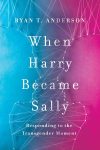 Ryan T. Anderson, When Harry Became Sally (Encounter)
Ryan T. Anderson, When Harry Became Sally (Encounter)
Popular culture and political action may have normalized transgender identity, but Anderson reminds readers how radical it is. “At the heart of the transgender moment are radical ideas about the human person — in particular, that people are what they claim to be, regardless of contrary evidence. A transgender boy is a boy, not merely a girl who identifies as a boy.” This is a metaphysical claim, one that needs to be subjected to more scrutiny than it has been. When Harry Became Sallyoffers a multidisciplinary critique of transgender identity
If you like my review, please vote “Helpful” on my Amazon review page.
 Mary Eberstadt, How the West Really Lost God (Templeton Press)
Mary Eberstadt, How the West Really Lost God (Templeton Press)
I haven’t yet written a full-blown review of this one yet, but here’s what I have up on Amazon right now:
Eberstadt is to be commended for writing a thought-provoking book, even if you don’t agree with all her thoughts. At a certain level of abstraction, I think the Family Factor makes sense as an explanation—a theory of variation—as to why Christian faith and practice has declined in some places and at some times, and why it has risen at others. At least to a degree. With Eberstadt, I do not think one can entirely discount other explanations, however. Moreover, as a Pentecostal, I don’t track with her fingering sixteenth-century Protestant Reformers as the first link in the chain toward family decline. The centuries between Luther and the 1960s are just too long. Still, I found How the West Really Lost Godan interesting, page-turning read and commend it to you to read.
If you like my review, please vote “Helpful” on my Amazon review page.
 Doris Kearns Goodwin,Leadership in Turbulent Times (Simon & Schuster)
Doris Kearns Goodwin,Leadership in Turbulent Times (Simon & Schuster)
The best way to study leadership is to study leaders. How they exercised influence in their contexts provides examples of how we can do so in ours. For this reason, it is paramount for leaders to be well-versed in biography and history, the knowledge of people and their times Doris Kearns Goodwin’s Leadership in Turbulent Times provides case studies of the leadership of four U.S. presidents at critical junctures in their administrations:
If you like my review, please vote “Helpful” on my Amazon review page.
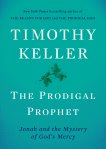 Timothy Keller, The Prodigal Prophet (Viking)
Timothy Keller, The Prodigal Prophet (Viking)
The ProdigalProphet makes for compelling reading. It explains the meaning of the Book of Jonah in its original context, but it draws out the implications of that meaning for our context. It shows the baleful ways Christians can worship ideological idols, misuse Scripture, and fail to love their neighbors as they should. But it also shows what a gospel-centered mission looks like, as well as how the gospel shapes our relationship with neighbors in our everyday lives.
If you like my review, please vote “Helpful” on my Amazon review page.
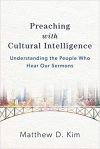 Matthew D. Kim, Preaching with Cultural Intelligence (Baker Academic)
Matthew D. Kim, Preaching with Cultural Intelligence (Baker Academic)
America is increasingly diverse, and so are American churches. Matthew D. Kim wants “to prepare twenty-first-century preachers for the realities of congregational diversity in North America and beyond.” To do so, he outlines a “homiletical template” to help preachers more effectively take into account their communities’ diversity in their preaching. He focuses specifically on diversity of denominations, ethnicities, genders, locations and religions. Preaching with Cultural Intelligenceis a must-read for preachers who want to effectively minister to people different from themselves.
If you like my review, please vote “Helpful” on my Amazon review page.
 Greg Lukianoff and Jonathan Haidt, The Coddling of the American Mind (Penguin Press)
Greg Lukianoff and Jonathan Haidt, The Coddling of the American Mind (Penguin Press)
As I mentioned at the outset of this review, I am serious when I say that every American concerned with the future of our nation’s public discourse and democratic culture should read The Coddling of the American Mind. It stimulated my thinking as a parent and helped form a better opinion of contemporary events as a concerned citizen. As a person, it provided an accessible introduction to cognitive behavioral therapy, identifying the cognitive distortions that misshape our opinions and hence misguide our actions. And it reminded me that people across the aisle from me—politically and religiously—are also intelligent and public-minded and can have things to say I need to hear. So, buy this book. Read it. Then share it.
If you like my review, please vote “Helpful” on my Amazon review page.
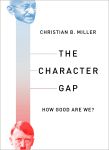 Christian B. Miller, The Character Gap (Oxford)
Christian B. Miller, The Character Gap (Oxford)
The cover of Christian B. Miller’s book, The Character Gap, has a picture of Gandhi at the top and Hitler at the bottom with a graded spectrum between them. The picture is fitting, for one of Miller’s central theses is that most people are neither as bad as we could be nor as good as we should be. We are, instead, a muddle. The question that arises, then, is how we can become better than we are.
If you like my review, please vote “Helpful” on my Amazon review page.
 Russell Moore, The Storm-Tossed Family (B&H Books)
Russell Moore, The Storm-Tossed Family (B&H Books)
The Lord redeeming the mess we have made of our families constitutes the bulk of Moore’s book. He discusses family milestones such as gender differences, marriage, sexuality, childbearing and adoption, parenting, divorce, trauma and aging. His words are wise, irenic and filled with astute theological insight, often expressed in memorable aphorisms. I’ll conclude with just such an aphorism, for it succinctly captures the theme of the entire book: “The only safe harbor for a storm-tossed family is a nail-scarred home.”
If you like my review, please vote “Helpful” on my Amazon review page.
 Jonathan Neumann, To Heal the World (All Points)
Jonathan Neumann, To Heal the World (All Points)
Tikkun olam is Hebrew for “to heal the world.” It has become a popular catchphrase among leftwing American Jewish rabbis and social activists. According to them, it is an ancient teaching of Judaism, and therefore a religious foundation for their politics. The only problem is that it isn’t. At least that’s what Jonathan Neumann concludes in To Heal the World. He argues that tikkun olam provides a religious covering for a political ideology that has been arrived at via nonreligious means. And that political ideology is “social justice.”
If you like my review, please vote “Helpful” on my Amazon review page.
 Karen Swallow Prior, On Reading Well (Brazos)
Karen Swallow Prior, On Reading Well (Brazos)
I have nothing but praise for this book. It exemplifies how to read well, both in the sense of reading closely and of reading through the lens of moral analysis. Perhaps the highest praise I can give the book is that when I turned its last page, I wanted to read (or re-read) the works of fiction it studied.
If you like my review, please vote “Helpful” on my Amazon review page.
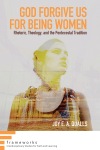 Joy E. A. Qualls, God Forgive Us for Being Women (Pickwick)
Joy E. A. Qualls, God Forgive Us for Being Women (Pickwick)
Even as hundreds of early Pentecostal women pioneered mission fields and planted churches, they often met resistance from men (typically) who felt the need to put them in their place by limiting their authority in the local church. My friend Joy Qualls explores this tension — between Pentecostal empowerment and hierarchical resistance, especially in the Assemblies of God — in her new book, God Forgive Us for Being Women.
If you like my review, please vote “Helpful” on my Amazon review page.
 Hans Rosling, Factfulness (Flatiron Books)
Hans Rosling, Factfulness (Flatiron Books)
I highly recommend reading Factfulness. Learning about material improvements to the human condition is exciting. But I also recommend it because it offers sound guidance about how to interpret the barrage of information presented to us daily. Knowing how to read, interpret, and filter out the noise in trends is a necessary component of a contemporary worldview, leading to better informed—and hence more productive—action.
If you like my review, please vote “Helpful” on my Amazon review page.
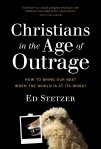 Ed Stetzer, Christians in the Age of Outrage (Tyndale Momentum)
Ed Stetzer, Christians in the Age of Outrage (Tyndale Momentum)
The vicious cycle of outrage and counter-outrage has got to stop, for the good of our culture and for the sake of the gospel. Christians need to demonstrate a better way. After all, if the Church is “the hermeneutic of the gospel,” as Lesslie Newbigin put it, then our unrighteous outrage may lead people away from God, giving Him a bad reputation in the process. You can be outraged or you can fulfill the Great Commission. You can’t do both. That’s why I highly recommend both Christians in the Age of Outrage and its author. If you’d like to see how he deals online with controversial issues in a Christian manner, follow @EdStetzer on major social media. Or check out his blog at ChristianityToday.com.
If you like my review, please vote “Helpful” on my Amazon review page.
 Karl Vaters, Small Church Essentials (Moody)
Karl Vaters, Small Church Essentials (Moody)
Small Church Essentials isn’t anti-big church by any stretch of the imagination. By the same token, though, it’s not uncritically pro-small church. “Small churches are not a problem, a virtue, or an excuse,” Vaters writes. “Jesus calls every church and every church leader for a purpose,” he concludes, “and He equips us with everything we need to accomplish that purpose.” Regardless of size. If you’re a small-church pastor who wants to increase your own capacity and your church’s capacity for effective ministry, I highly recommend this hopeful, helpful book.
If you like my review, please vote “Helpful” on my Amazon review page.

